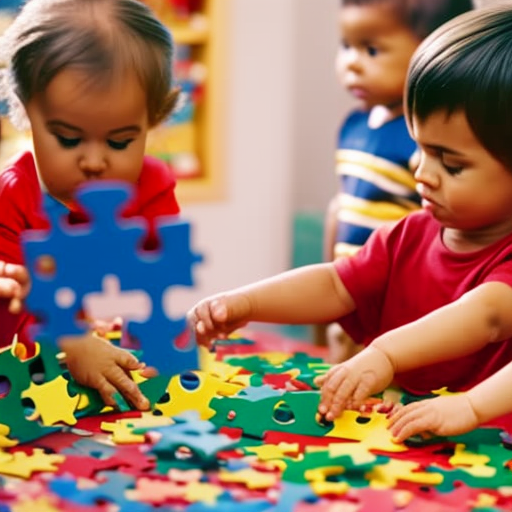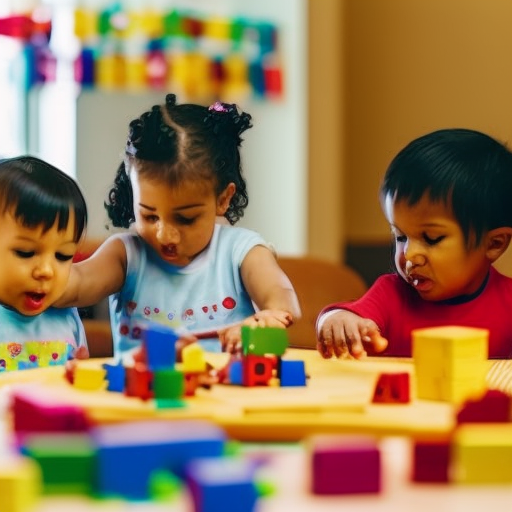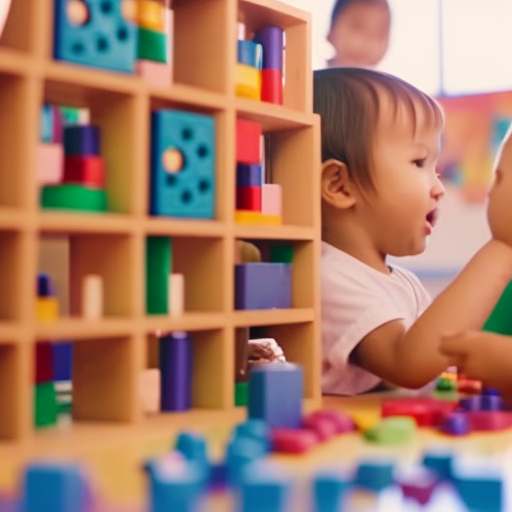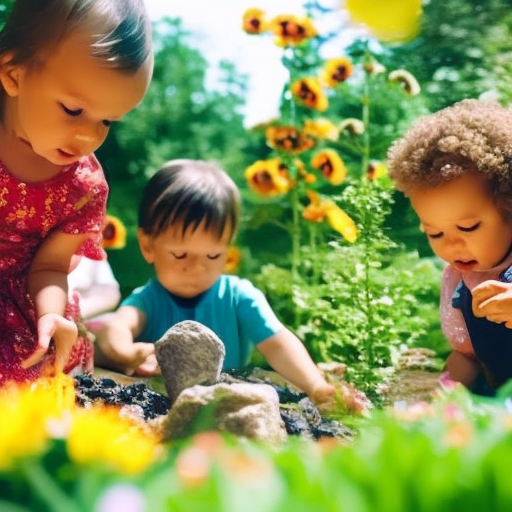"Cherishing Little Steps - A Haven for Baby and Family Journeys"
Educational Games for Preschoolers
Are you searching for engaging and effective educational games for your preschooler? Look no further!
Our collection of educational games for preschoolers will captivate their curious minds and foster a love for learning. These games are designed to be interactive, promoting active participation and hands-on exploration.
From interactive puzzles to creative problem-solving activities, your little one will develop essential skills while having a blast. They can dive into math games, language and literacy games, and even embark on exciting science and nature explorations.
Not only will these games enhance their cognitive abilities, but they will also help develop fine motor skills and promote social and emotional learning.
Get ready to embark on an educational adventure with your preschooler today!
Key Takeaways
- Educational games for preschoolers can enhance problem-solving strategies and critical thinking skills.
- These games can improve numeracy skills through number recognition and counting, as well as develop basic arithmetic skills.
- Language and literacy development can be fostered through educational games by expanding vocabulary, improving communication skills, and enhancing deductive reasoning.
- Educational games can also promote fine motor skill development, social-emotional learning, and encourage positive interactions and social growth.
Interactive Puzzles

If you want to engage your preschooler in a fun and educational activity, try playing interactive puzzles with them. Not only will it keep them entertained, but it will also help develop their problem-solving strategies and critical thinking skills.
Interactive puzzles come in various forms, such as jigsaw puzzles, matching games, and shape sorting activities. These games require your preschooler to think logically and find solutions to the challenges presented. As they attempt to fit the puzzle pieces together or match the correct shapes, they’re actively using their problem-solving skills.
By engaging in interactive puzzles, your preschooler will learn to analyze situations, think critically, and make decisions. They’ll develop a systematic approach to problem-solving, learning to break down complex tasks into smaller, more manageable steps. This process fosters their ability to think creatively and find innovative solutions.
Playing interactive puzzles with your preschooler also promotes cognitive development. As they manipulate the puzzle pieces or sort the shapes, they enhance their hand-eye coordination and fine motor skills. They learn to concentrate, focus, and pay attention to detail, all of which are essential for academic success.
Creative Problem-Solving Activities

Engage your preschooler in creative problem-solving activities to enhance their critical thinking skills and cognitive development. These activities not only stimulate their imagination but also encourage them to think outside the box and develop innovative problem-solving techniques. Here are some critical thinking exercises you can try with your little one:
| Activity | Description |
|---|---|
| Building Blocks | Encourage your child to build structures using different shapes and sizes of blocks. This activity helps them develop spatial awareness and problem-solving skills as they figure out how to balance and create stable structures. |
| Puzzles | Introduce age-appropriate puzzles to your preschooler. Puzzles challenge their problem-solving abilities and teach them patience and perseverance. Start with simple puzzles and gradually increase the difficulty level as they progress. |
| Storytelling | Encourage your child to create their own stories using their imagination. This activity enhances their critical thinking skills as they come up with unique characters, settings, and plotlines. It also promotes language development and creativity. |
| Science Experiments | Conduct simple science experiments together, such as mixing colors or exploring the properties of water. This hands-on activity encourages your preschooler to think critically, make observations, and draw conclusions. |
Math Games

To enhance your preschooler’s critical thinking skills and cognitive development, introduce them to engaging math games. These games not only make learning fun but also help your child develop a strong foundation in math.
Here are some exciting math games that your preschooler will love:
-
Counting games:
-
Number Hunt: Hide objects around the house and ask your child to find a specific number of items.
-
Counting Cards: Create cards with numbers and objects, and have your child match the correct number of objects to each card.
-
Addition and subtraction activities:
-
Number Line Jump: Lay out a number line and ask your child to jump forward or backward a certain number of spaces to solve simple addition and subtraction problems.
-
Math Bingo: Create bingo cards with numbers and simple addition or subtraction problems. Your child can solve the problems and mark off the correct answers on their bingo card.
These math games won’t only improve your preschooler’s numeracy skills but also foster their love for learning. So, grab some counting games and get ready for some math fun with your little one!
Language and Literacy Games

Introduce your preschooler to language and literacy games to enhance their communication skills and foster a love for reading and writing. Vocabulary building is essential for a child’s language development, and there are many fun and interactive games that can help expand their word bank.
Word association games, where you say a word and your child responds with a word that’s related, can be a great way to build their vocabulary. You can also play ‘I Spy’ games, where you describe an object and your child has to guess what it’s based on the clues provided.
Storytelling activities are another fantastic way to promote language and literacy skills. Encourage your preschooler to create their own stories by providing them with story starters or picture cards. They can use their imagination to come up with characters, settings, and plotlines.
You can also engage in interactive storytelling by taking turns adding to a story. This not only enhances their language abilities but also nurtures their creativity and critical thinking skills.
By incorporating language and literacy games into your child’s routine, you can help them develop a strong foundation for communication and a love for reading and writing. These games provide a fun and interactive way for your preschooler to grow their vocabulary and improve their storytelling abilities.
Science and Nature Exploration

As you continue to foster your preschooler’s language and literacy skills, it’s important to also delve into the exciting world of science and nature exploration. Outdoor adventures and learning about animal habitats can provide valuable hands-on experiences that ignite your child’s curiosity and love for the natural world.
Here are some ideas to get you started:
-
Nature Scavenger Hunts: Take your little one on a scavenger hunt in your backyard or a nearby park. Create a list of items for them to find, such as leaves, rocks, or flowers. Encourage them to observe and discuss the different textures, colors, and shapes they come across.
-
Animal Habitat Exploration: Visit a local nature center or zoo to explore different animal habitats. Talk about where animals live and what they need to survive. Encourage your child to ask questions and engage in conversations with the knowledgeable staff.
By incorporating outdoor adventures and animal habitat exploration into your preschooler’s learning, you’re providing them with opportunities to develop important scientific skills such as observation, critical thinking, and problem-solving. These experiences won’t only enhance their understanding of the natural world but also foster a love for nature that will last a lifetime.
Memory and Matching Games

Engage your preschooler’s cognitive skills with memory and matching games. These cognitive development games aren’t only fun but also help in improving memory and concentration. Memory improvement activities are an essential part of a child’s early learning journey. By playing these games, your child can enhance their ability to remember and recall information.
Memory games involve flipping cards and matching pairs. This activity strengthens your child’s memory skills as they try to remember the position of each card. Matching games, on the other hand, require your child to find objects or pictures that are identical. This helps them in developing their visual discrimination skills and improving their ability to recognize patterns.
In addition to improving memory, these games also enhance other cognitive abilities such as attention and problem-solving skills. Your child will learn to focus and concentrate on the task at hand, which is crucial for their overall development.
To make these games even more engaging, you can create your own memory cards or matching sets using pictures or words that are familiar to your child. You can also increase the difficulty level as your child progresses by using more cards or adding more complex patterns.
Fine Motor Skill Development
Develop your preschooler’s fine motor skills with hands-on activities that require precise movements and coordination. Fine motor skills are essential for everyday tasks such as buttoning clothes, tying shoelaces, and writing. By engaging in activities that promote fine motor skill development, your child won’t only enhance their hand-eye coordination but also strengthen their finger muscles.
Here are some fun and interactive ways to help your preschooler refine their fine motor skills:
-
Sensory Play:
-
Create a sensory bin filled with materials like rice, beans, or sand. Encourage your child to dig, scoop, and pour using small cups or spoons. This sensory experience will stimulate their senses while improving their hand dexterity.
-
Playdough is another fantastic tool for sensory play. Encourage your child to mold, squeeze, and roll the dough to strengthen their hand muscles and improve their fine motor skills.
-
Hand-eye Coordination:
-
Set up an obstacle course using pillows, hula hoops, and cones. Encourage your child to navigate through the course, promoting their hand-eye coordination as they maneuver around objects.
-
Practice cutting with child-safe scissors. Start with simple shapes and gradually progress to more intricate designs. This activity will enhance their hand-eye coordination and fine motor control.
Social and Emotional Learning Activities

Encourage your preschooler’s social and emotional development by fostering positive interactions with their peers and recognizing their own feelings. Social and emotional learning activities play a crucial role in helping children develop important skills such as conflict resolution, empathy, and understanding.
One effective activity to promote conflict resolution skills is to engage your child in role-playing scenarios. You can set up a pretend play area where they can act out different situations, such as sharing toys or taking turns. This allows them to practice problem-solving and finding peaceful resolutions.
Another activity that promotes empathy and understanding is reading books together that focus on emotions and feelings. Choose stories that have relatable characters and situations, and discuss the characters’ emotions and how they might be feeling. This helps your child develop empathy by understanding that others have different emotions and experiences.
Additionally, encouraging your child to express their own feelings is essential for their emotional development. Create a safe and open environment where they feel comfortable sharing their emotions with you. This can be done through simple conversations or by using tools such as emotion cards or a feelings chart.
Frequently Asked Questions
Are There Any Safety Concerns Associated With Playing Educational Games for Preschoolers?
You might be wondering about safety concerns when playing educational games for preschoolers. It’s important to keep screen time limits in mind and ensure the games are age-appropriate and free from harmful content.
How Can Parents Ensure That Their Preschoolers Are Getting the Most Out of Playing Educational Games?
To ensure your preschooler gets the most out of playing educational games, focus on maximizing their learning potential. Strike a balance with screen time and engage in interactive activities that reinforce what they learn.
Are There Any Specific Educational Game Recommendations for Preschoolers With Special Needs?
For preschoolers with special needs, there are recommended educational games that cater to their unique learning styles. These inclusive and adapted games promote personalized learning, providing a fun and effective way for them to thrive academically.
Can Playing Educational Games Too Often Have a Negative Impact on a Preschooler’s Development?
Playing educational games too often can have negative effects on your preschooler’s development. It’s important to balance screen time with other activities to promote a well-rounded learning experience.
Are There Any Research Studies That Support the Effectiveness of Educational Games for Preschoolers?
Research findings show that educational games for preschoolers have numerous benefits. They improve cognitive skills, enhance problem-solving abilities, and promote early literacy and numeracy. So, don’t hesitate to let your little ones play these games!
Conclusion
In conclusion, educational games for preschoolers provide a fun and engaging way for young children to learn and develop important skills.
These games offer interactive puzzles, creative problem-solving activities, math and language games, and more.
By incorporating these games into their playtime, preschoolers can enhance their cognitive abilities, improve their fine motor skills, and develop social and emotional capabilities.
So why wait? Start exploring the world of educational games and watch your preschooler thrive!



Your point of view caught my eye and was very interesting. Thanks. I have a question for you.
Rattling superb info can be found on blog.Blog monetyze